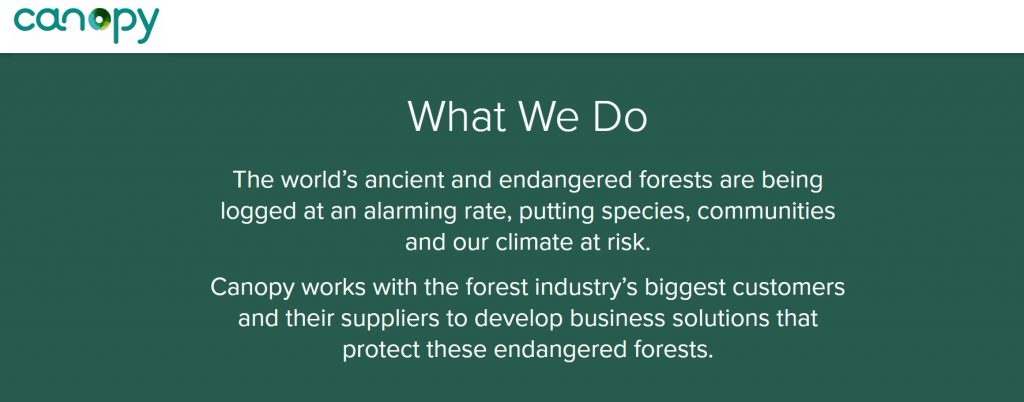 A natural and biodegradable fibre, Sateri’s Lyocell is made from wood pulp sourced from sustainable plantations. It is manufactured using closed-loop technology, requiring minimal chemical input during the production process, and utilising an organic solvent that is non-toxic and harmless which can be 99.7% recovered and recycled. (Source: Sateri)
A natural and biodegradable fibre, Sateri’s Lyocell is made from wood pulp sourced from sustainable plantations. It is manufactured using closed-loop technology, requiring minimal chemical input during the production process, and utilising an organic solvent that is non-toxic and harmless which can be 99.7% recovered and recycled. (Source: Sateri)
Sateri Shares Views on Canopy Hot Button Report
Canopy, a Canada-based NGO, releases a ‘Hot Button Ranking and Report’ yearly. The Report is intended to be a primary fibre sourcing tool for the fashion industry. ‘Buttons’ and coloured ‘shirts’ are assigned to major viscose and other cellulosic fibre producers based on a set of criteria designed by Canopy.
 Canopy’s Hot Button Ranking and Report is the primary fibre sourcing analysis tool for the fashion sector. This includes the CanopyStyle brands, retailers, and designers that are committed to eliminating the use of Ancient and Endangered Forests in viscose and other cellulosic fabrics, and to giving preference to textiles made from innovative fibres.
Canopy’s Hot Button Ranking and Report is the primary fibre sourcing analysis tool for the fashion sector. This includes the CanopyStyle brands, retailers, and designers that are committed to eliminating the use of Ancient and Endangered Forests in viscose and other cellulosic fabrics, and to giving preference to textiles made from innovative fibres.
Survival: A Pulp Thriller Video by Canopy
In 2020 Hot Button Ranking, Sateri has been awarded total 13 buttons and the company has been classified as one practicing high risk sourcing with an index of minus 3. Sateri’s contribution to world’s total production is 19.3 percent.
Sateri has issued the following explanation regarding it’s sourcing practices.
From time to time, our customers and stakeholders have asked us why we have not attained a ‘Green’ shirt despite being a leading global viscose producer. Below are some questions we frequently receive.
Why does Sateri continue to source from ‘ancient & endangered’ forests?
Canopy’s ‘high risk’ label of Sateri is not based on any factual, objective assessment in our view. The identification of ‘ancient & endangered’ (A&E) forests is wholly informed by Canopy’s online ForestMapper tool which identifies the majority of Indonesia and Malaysia as A&E. This is due to a significant lack of precision provided by the tool (low spatial resolution of 100kmx100km) which ignores the complexity of forest landscapes particularly in developing economies.
Notably, there is general lack of A&E forests as defined by the tool in Europe or other OECD countries. Compared to more broadly referenced and peer-reviewed geo-spatial frameworks like the World Resources Institute’s Global Forest Watch and the “Global Safety Net”, the ForestMapper tool is not well-recognised and supported in the forestry sector.
Why can’t Sateri source from other regions?
Sateri adheres to a strict pulp sourcing policy that upholds the principle of No Deforestation and Exploitation. This policy applies to all suppliers, regardless of sourcing region. The majority of our wood pulp comes from Brazil and Indonesia. We are proud to support meaningful livelihoods of workers and communities in these developing countries, and sustainable development that is inclusive; not exclusive.
How can Sateri help to address legacy issues around deforestation in relation to your suppliers?
All our supplier forestry concessions are licensed and operate within the rule of law. Every country has its own land use and economic development plan. Any allegation of deforestation must be verified, ground-truthed, and understood within the complexities of local conditions and risks such as illegal encroachment.
Beyond supporting no deforestation in our supply chain, we believe in active protection and restoration of natural forests and biodiversity. Our strategic supplier, APRIL, has a unique 1-for-1 conservation commitment backed by a decade-long USD100 million investment; where every hectare of production forests is matched by a hectare of protected forests.
How is Sateri working with Canopy; when does Sateri expect to attain a ‘green shirt’?
We have engaged with Canopy for five years now. We responded positively to a number of Canopy requests, including adopting an action plan to address gaps in our supply chain, and a commitment to Next Generation textile fibre innovation and technology.
We remain open and keen to pursue constructive engagement that is sincere, fair, objective, and towards improved outcomes for ourselves and for the environment. Our strategic partner, APRIL, has also been in active and facilitated dialogue with Canopy in more recent years.
Equally important, we believe that active engagement with all interested stakeholders in the value chain is beneficial and critical. We welcome stakeholders to reach out to us directly so they can receive accurate information and understanding.
About Sateri
Sateri is a global leader in viscose rayon. Our natural and high-quality fibre, made from trees grown on renewable plantations, can be found in comfortable textiles and skin-friendly hygiene products. As the largest maker of viscose fibre in the world – with five viscose mills and annual capacity of 1.4 million metric tonnes – we are committed to sustainability, environmental protection and responsible production from start to finish. We also operate Linz (Nanjing), a yarn spinning mill, and a 20,000 ton Lyocell facility.
